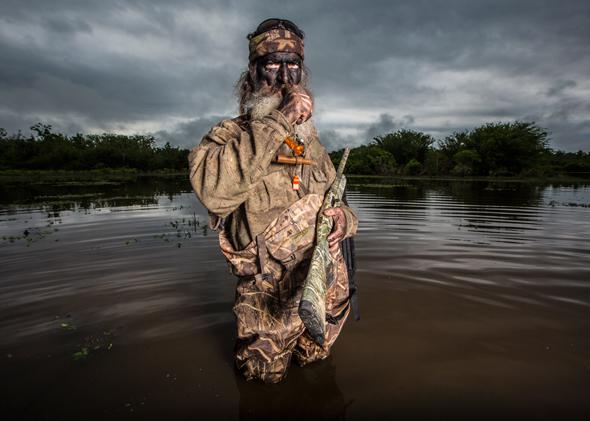Dearest couch potatoes,
You know who also aren’t bad either, acting-chops wise? The hirsute hams who star in A&E’s extremely popular Duck Dynasty, which looks like a reality TV show but is edited like a sitcom. On each episode, the bearded and close-knit Robertson clan find themselves in some prototypical sitcom scenario—going to a high-school reunion, making time for conjugal relations, participating in enforced family bonding—which they flesh out with zingers and punch lines better than the ones masterminded by most writers’ rooms. (Loopy Uncle Si and smart-aleck Jase, in particular, would fit in on any sitcom.) Duck Dynasty works with themes and stories right out of I Love Lucy and The Honeymooners, but it’s spiffed up with a winking, knowing reality show varnish and some unfakeable human idiosyncrasy—which, unfortunately, includes some virulent homophobia. The family patriarch, Phil, was suspended earlier this month by A&E for publically revealing himself to be homophobe, a turn of events probably not that surprising to many Duck Dynasty viewers: The Robertsons are conservative, and the show dog whistles in a very Christian register, as Jim pointed out in his piece on the complexities of the suspension. The on-air show labors, successfully I think, to appeal to a wide audience, but the Robertsons’ religious and political beliefs thrum below the surface.
Now that I have shouted out some of my favorite performances of the year (one more! Niecy Nash’s compassionate, lovely performance in HBO’s Getting On), I would like to turn to something more controversial: bad acting. I have written about this before, but I think TV is extraordinarily generous to middling actors. Over time, you start to mistake bad acting for a personality trait. January Jones’ limited range becomes something innate in Betty Draper, her woodenness a part of her character. As such, unless it’s a one-off like Carrie Underwood in The Sound of Music, bad acting doesn’t much get in a show’s way. (See: Somehow, Mischa Barton did not ruin The O.C.).
And yet I would have liked Masters of Sex so much more if I could have bought into Lizzy Caplan’s performance more thoroughly. I have adored Caplan in everything I’ve ever seen her in—Party Down, Bachelorette, Save the Date, New Girl, Mean Girls, Hot Tub Time Machine, even CBS’s canceled sitcom The Class— but I found her Virginia Johnson to be overly mannered. (Michael Sheen was even less appealing, but his character is supposed to be a frigid headcase.) It felt like she was smizing all the time, perpetually suppressing a coy smile, putting on a performance even when the character wasn’t supposed to be performing anymore. The mask never dropped.
And while I am encouraging people to write me hate mail, I am going to go all in. Kerry Washington: Not that good on Scandal. She gets the job done. She is gorgeous, she’s got chemistry with all those dudes, she cries and yells like a champ (New Girl and Scandal could have a really intense shout-off if they were so inclined), and she doesn’t take away from the gonzo roller coaster that is her show, but … not a huge range there.
In an attempt to one day make it safe for me to go back on Twitter again, I would like to talk a little more positively about Scandal, which, Jim, you mentioned a little hesitation about. During the run-up to the Breaking Bad finale, The New Yorker’s Emily Nussbaum wrote a piece about the “bad fan,” which argued that, yes, in fact, there is a wrong way to watch a show like Breaking Bad, and it is to be the sexist, hero-worshipping viewer who hates Skyler White for constantly getting in badass Walt’s way. The bad fan does not only exist in a Breaking Bad context: The Sopranos’ Carmela, Mad Men’s Betty, and Sons of Anarchy’s Tara have all, to use Jim’s term, been targets of “fan-bros.” This idea, that there is a “you’re doing it wrong” for watching television, is pretty audacious: When it comes to bad taste, we usually just agree that other people have it and leave it at that. But it’s an audacity supported by Breaking Bad (and The Sopranos and Mad Men) itself: Vince Gilligan does not co-sign the “Skyler is a bitch” position. He has said that publically, and he put that sentiment into his show, even if the bad fan refused to see it.
What I find so tremendous about Scandal, especially this season, is the way that Shonda Rhimes is not even throwing Scandal’s bad fans a life preserver. She has talked about how twisted and messed up every character on her show is and the, to her, sometimes strange moral calculus fans perform to continue rooting for Fitz and Olivia. But she doesn’t put that moral judgment in the show itself: She loves all her characters, and she invites you to do so as well, even though they are torturers and murderers and teeth-pullers and election-stealers. Breaking Bad was a boat in choppy anti-hero waters, but Vince Gilligan laid out a path to shore; it’s just that some people refused to use it. In Scandal you’ve got to navigate for yourself, and some viewers are just sailing out into the Olivia-and-Fitz-forever-and-ever sea, ignoring the cheating and lying and killing under the keel. In Scandal, as in life, the only person who is going to tell you right from wrong is yourself—and sometimes you get it wrong.
As we head into the home stretch I want to make sure we hit every single thing you felt most passionately about: every single one! So tell me your superlatives, your biggest laugh, your favorite line, your most beloved scene, the worst show, the best performance in the worst show and every and any other –iest you can think of.
You guys are better company than my television,
Willa
